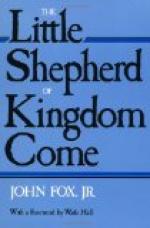“Left face! Double-quick!” is the ringing order, and, by magic, the line concentrates in a solid phalanx and sweeps forward.
This was the way Morgan fought.
And thus, marching and fighting, he went his triumphant way into the land of the enemy, without sabres, without artillery, without even the “Bull Pups,” sometimes—fighting infantry, cavalry, artillery with only muzzle-loading rifles, pistols, and shotguns; scattering Home Guards like turkeys; destroying railroads and bridges; taking towns and burning Government stores, and encompassed, usually, with forces treble his own.
This was what Morgan did on a raid, was what he had done, what he was starting out now to do again.
Darkness threatens, and the column halts to bivouac for the night on the very spot where, nearly a year before, Morgan’s Men first joined Johnston’s army, which, like a great, lean, hungry hawk, guarded the Southern border.
Daniel Dean was a war-worn veteran now. He could ride twenty hours out of the twenty-four; he could sleep in his saddle or anywhere but on picket duty, and there was no trick of the trade in camp, or on the march, that was not at his finger’s end.
Fire first! Nobody had a match, the leaves were wet and the twigs soggy, but by some magic a tiny spark glows under some shadowy figure, bites at the twigs, snaps at the branches, and wraps a log in flames.
Water next! A tin cup rattles in a bucket, and another shadowy figure steals off into the darkness, with an instinct as unerring as the skill of a water-witch with a willow wand. The Yankees chose open fields for camps, but your rebel took to the woods. Each man and his chum picked a tree for a home, hung up canteens and spread blankets at the foot of it. Supper—Heavens, what luck—fresh beef! One man broils it on coals, pinning pieces of fat to it to make gravy; another roasts it on a forked stick, for Morgan carried no cooking utensils on a raid.
Here, one man made up bread in an oilcloth (and every Morgan’s man had one soon after they were issued to the Federals); another worked up corn-meal into dough in the scooped-out half of a pumpkin; one baked bread on a flat rock, another on a board, while a third had twisted his dough around his ram-rod; if it were spring-time, a fourth might be fitting his into a cornshuck to roast in ashes. All this Dan Dean could do.
The roaring fire thickens the gloom of the woods where the lonely pickets stand. Pipes are out now. An oracle outlines the general campaign of the war as it will be and as it should have been. A long-winded, innocent braggart tells of his personal prowess that day. A little group is guying the new recruit. A wag shaves a bearded comrade on one side of his face, pockets his razor and refuses to shave the other side. A poet, with a bandaged eye, and hair like a windblown hay-stack, recites “I am dying, Egypt— dying,” and then a pure, clear, tenor voice




